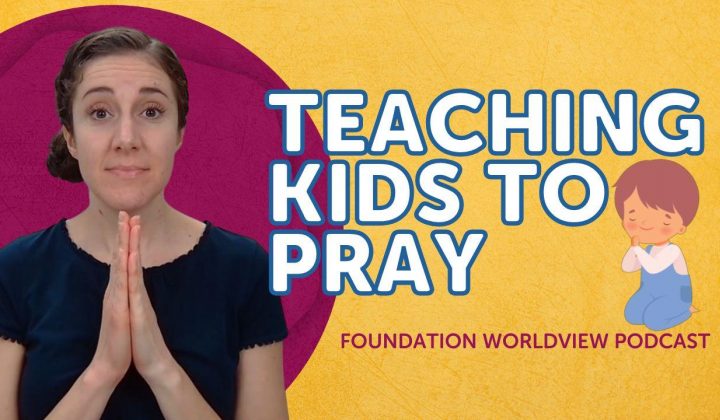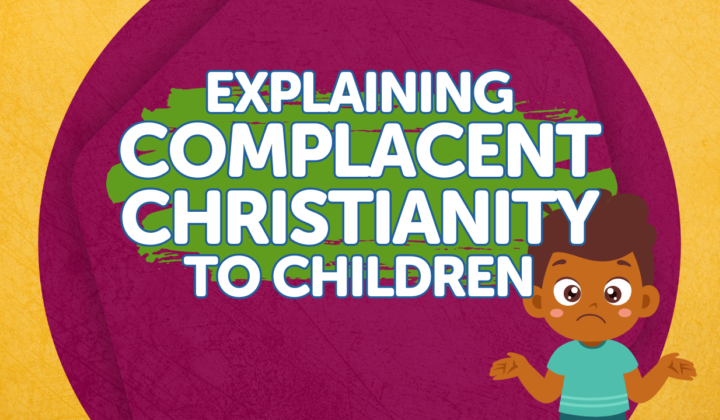Learn more about the journey that led to us equipping kids to carefully evaluate every idea they encounter.
Meet members of our team who have contributed to curriculum development.
Hear from real users of the Foundation Curriculum.
Learn what we believe about God, Jesus, Scripture, and more.
The Missing Piece of Gratitude in Christian Family Life
In this episode of the Foundation Worldview Podcast, Elizabeth Urbanowicz explores a crucial but often overlooked element of gratitude—giving thanks in and for suffering. She unpacks four key Scripture passages to help parents model and teach this biblical grace to their children. Discover how gratitude for challenging circumstances can shape character, deepen hope, and conform us to the image of Christ. Tune in for practical tips to incorporate gratitude into your family’s daily rhythms and routines.
Transcript
Note: The following is an auto-transcript of the podcast recording.
Hello friends. On today's podcast we're going to be talking about one key element of gratitude that I think is often missing from the Christian life and the Christian family life in general. Now, this is the month of November and November is the month in the United States when we focus on gratitude, and as I've been on social media this month, I have seen so many different family traditions where families are showing how they're teaching their kids to express gratitude. And I am so very grateful for this and I'm encouraged by this because as Christians we are called to be a grateful people. Gratitude should be our way of life. However, I have noticed that there is just this one element of gratitude that seems to be missing from much of our Christian gratitude. So that's what we're going to focus on today on the Foundation Worldview Podcast.
Now, normally on this podcast we're answering your questions, which today's podcast is not focused on answering a question, but just looking at the topic of gratitude in general. But normally we're answering your questions so that you can equip the children that God has placed in your care to carefully evaluate every idea they encounter so that they can understand the truth of the biblical worldview. I'm your host, Elizabeth Urbanowicz, and I'm thrilled that you've joined me for this episode today. Now, after that little introduction, you may be wondering, Elizabeth, what is this element that is missing from our gratitude? Now, I don't think it's anything earth shattering because this is an element of gratitude that is distinctly biblical, but I think we often overlook, and that is the importance of giving gratitude in and through suffering. Now, it's really easy to give gratitude for all of the things that we naturally view as good gifts for things like family and health and jobs and other things that we want or that we enjoy. And if we are making gratitude a habit in our homes, that is such an important first step. So if you are doing those things in your home, please don't feel like you are doing something majorly wrong because just grounding our kids in the grace of gratitude is distinctly biblical and it's so important. However, often we don't necessarily thank God in and through and for our suffering, but I think that this is a distinctly biblical concept.
So I'm just going to take us through four passages of Scripture just to build the case for why I think we need to make sure that we are modeling for our children and teaching them how to give thanks in and even four suffering. So the first passage we're going to look at is 1 Thessalonians 5 verses 16 through 18, and this passage reads, "Rejoice always, pray without ceasing, give thanks in all circumstances; for this is the will of God in Christ Jesus for you." Now, there are several places throughout the New Testament where we are explicitly told this is God's will for you. And often as Christians, we're thinking of the circumstances of our life and should we choose this job or that job, should we send our kids to this school or should we homeschool or should we do this or what should we buy or different things like that. And we're seeking out the Lord's will where there are several places in Scripture where we have been directly told what God's will is for us. And in this passage we are told that it is God's will that we rejoice always, we pray without ceasing and we give thanks in all circumstances. So this passage makes explicit that God, his will for us is that no matter the circumstance that we are in, that we give thanks.
The next passage we're going to look at is Ephesians chapter 5 verses 18 through 20. And this passage reads, "And do not get drunk with wine, for that is debauchery, but be filled with the Spirit, addressing one another in psalms and hymns and spiritual songs, singing and making melody to the Lord with your heart, giving thanks always and for everything to God the Father in the name of our Lord Jesus Christ". Now 1 Thessalonians 5 made clear that it's God's will for us to give thanks in all circumstances, that no matter the circumstance we're in, we're to give thanks in it. Where Ephesians 5 builds upon it and says, not only are we supposed to give thanks in all circumstances, but we are supposed to give thanks for all circumstances. Now, you might be thinking, Elizabeth, you've got to be kidding me. I'm supposed to give thanks for horribly traumatic things that have happened, the evil that I've seen around me and that I've experienced. And this can seem like a really shocking concept. And we have to look at Scripture to understand why is it that we are to give thanks even for circumstances that do not align with the way God originally designed the world? Why is it that we are called to give thanks in and even for these circumstances?
Now, there's a whole host of passages of Scripture we could go to, but we try really hard to keep this podcast under 20 minutes. So I'm just going to take us to two passages, both in the book of Romans. The first passage is Romans chapter 5, verses 1 through 5, and this passage reads, "Therefore, since we have been justified by faith, we have peace with God through our Lord Jesus Christ. Through him we have also obtained access by faith into this grace in which we stand, and we rejoice in the hope of the glory of God. Not only that, but we rejoice in our sufferings, knowing that suffering produces endurance, and endurance produces character, and character produces hope, and hope does not put us to shame because God's love has been poured into our hearts through the Holy Spirit who has been given to us." Now in this passage, it makes clear that we are to rejoice not just for the amazing gift of salvation, which is something to rejoice and to give thanks for, but we are also to rejoice in our suffering. And I love how Paul sets it up here showing us the progression of what suffering leads to. And he says that we can rejoice in our sufferings because suffering produces endurance and endurance produces character, and character produces hope. And that hope doesn't put us to shame because God's love has been poured into our hearts. And so anytime we are going through some form of suffering, we can thank God for that because ultimately that is leading to our endurance, the shaping of our character and the grounding of our hope in the one place where it is unshakeable in God's love for us through Jesus.
The final passage we're going to look at is also in Romans. And for those of you who are faithful Foundation Worldview podcast listeners, this passage should be very familiar to you because it is the passage that I paraphrase at the end of every Foundation Worldview podcast. And that is Romans chapter 8, verses 28 and 29, and this passage reads, "And we know that for those who love God all things work together for good, for those who are called according to his purpose. For those whom he foreknew he also predestined to be conformed to the image of His Son". So in this passage, Paul is saying that all of the circumstances of our life, God is weaving them together for good, and he doesn't leave us in the dark as to how this is being done. On this side of eternity, we may never be able to see good come out of different circumstances in our life, but Paul makes clear that God has predestined us to be conformed to the image of His Son, and God uses all of the circumstances of our lives to conform us into the image of His Son.
And Jesus went through suffering that is greater than any suffering we will ever experience because not only did he experience the agony of being crucified, but he experienced the intense spiritual agony of having the sin of the world placed upon him. We will never know the agony of that. But as we walk through suffering, God is conforming us more into the image of His Son. And when we live each day in light of eternity, we have a clearer understanding that being conformed more to the image of Jesus is the ultimate goal. So my encouragement for us this Thanksgiving is to not only walk our children through gratitude for the good, pleasing, beautiful, peaceful, comfortable circumstances and gifts that God has given us. And there are many of those things and we should give thanks for them, but that we would also give thanks for the really hard things, the difficult things, the things that we wish were different in our lives.
So now the question is, okay, how do we actually incorporate this in our daily rhythms and routines at home? The first thing that I would encourage all of us to do is to model this for our children. That our children see us in the everyday moments. They see us at our highs and at our lowest lows. And when they see us during those lows, during times of intense suffering, are we modeling giving thanks. Now, please don't hear me ask this question and think that this means that we have to be perfect in all circumstances. We can. That's why we need Jesus. That's why we need God's grace continually. And there's going to be times when we don't automatically go to gratitude in these terrible circumstances, but our children are with us today and tomorrow and the next day. And so we can always circle back and we can repent of mistakes that we've made of sins that we've committed and then model giving gratitude for these circumstances in our lives which we wish were different. So that's the first thing that we can model this. We're going to model it imperfectly, but that's okay because that's again pointing our children towards their need for Jesus.
Then when our children experience suffering, when they go through a difficult or a painful circumstance, we can model giving gratitude by praying this way. If your child this year is really struggling in school, maybe they have a learning disability and they feel like they're falling far behind their class as you're praying with them at night, you can say, Lord, we thank you that you've given so-and-so this learning disability that you've allowed her to have it. We don't know how you're going to use it for good in her life, but we do know that you've promised that you are going to use it to conform her more into the image of your son. So please give her the endurance that she needs. Or if one of your children has come down with an illness that's taking a long time for them to get over praying for them and saying, God, we ask that you would take this illness away. We know that you did not originally design the world with these illnesses, but we know this as a result of human sin and we thank you God for this illness. We thank you for the way that it points us to you and ask that you would heal name your son, that you would heal his body and continually point us to you. So we can point our children towards gratitude and suffering in the way that we pray for them.
And then in this Thanksgiving season, this is something that you can incorporate into your daily and weekly gratitude rhythms. If you're writing down on little leaves or something else, things to be grateful for, talk through what is one thing that your family wishes was different and you don't understand it, you don't want it, if you had a choice, you wouldn't choose it, but you are going to choose to be obedient and give God thanks for it because you know that that suffering is producing perseverance, that perseverance is producing character, that character is producing hope, and that hope is not going to disappoint you because ultimately God is conforming you more into the image of His Son.
Also, if you are not part of the Foundation Worldview Book Club, I highly recommend that you sign up for it because in your inbox every month you will get recommended reading titles for your kids. And along with corresponding worldview questions, and this month we gave out a title also for adults, and that title was Choosing Gratitude by Nancy DeMoss Wolgemuth. So highly recommend you check out our book club. Check out that book because that book is a quick and easy read, and it will just give you some more ideas about gratitude, why gratitude is so important, and how you can continue to incorporate the biblical grace of gratitude into your daily lives.
Now, if you are watching this podcast on YouTube, would just ask in the comments, would love to hear some of the ways that you incorporate rhythms and routines of gratitude into your family's life. And if you share those, I'm sure that can be an encouragement to others who are watching and listening, and it's always great to share ideas and get good ideas from others who are faithfully seeking to raise up their children in the faith. Thank you so much for investing this time in your life to listen to the Foundation Worldview Podcast. As we end our session today, my prayer for you is the same as always, and it's from Romans chapter 8, verses 28 and 29. And my prayer is that no matter the situation in which you and the children God place in your care, find yourselves that you would trust that God is working all things together for your good. By using all things to conform you more into the image of His Son. I'll see you next time.
Related Posts and insights

Teaching Kids to Pray
How do we teach kids to pray? In this episode, Elizabeth Urbanowicz answers a question received from a grandparent on teaching their 2 year old how to pray. If you're a parent or grandparent with children 2 years old on up, you won't want to miss this episode.

Explaining Complacent Christianity to Children
In this episode, we dive into how to explain complacent Christianity to your children—addressing love of wealth, lack of hospitality, and more. Learn how to guide your kids toward a biblical understanding of what a faithful Christian life should look like, even when those around them in the church may not reflect it. Tune in for practical advice on helping your children recognize and embrace true Christian living.

Why Does God Allow Suffering?
In this episode, host Elizabeth Urbanowicz dives into a deeply important question: how can a good and loving God allow suffering? This is a question that has been asked throughout history, and Elizabeth explores how to best teach our children to have a healthy theology of suffering. With practical advice and valuable resources, this episode will help you prepare your children to navigate a world full of suffering with a solid biblical foundation.




